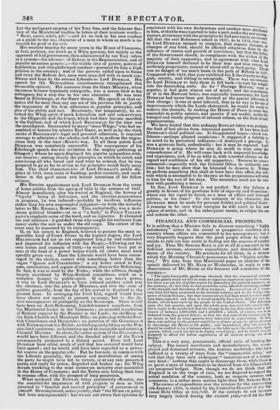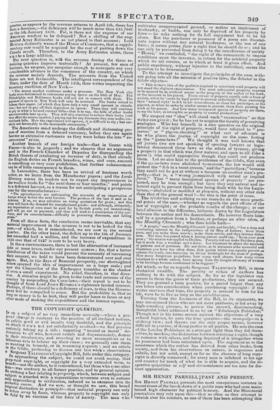FINANCIAL AND COMMERCIAL PROSPECTS.
IT is seldom that a Minister fails to discover something "highly satisfactory" either in the actual or prospective condition of country whose affairs are committed to his management ; but it very frequently happens that the good people whom he conde- scends to rule are less acute in finding out the sources of comfort and joy. Thus Mr. SPRING RICE is not at all disconcerted by the deficient revenue, excessive expenditure, and diminished com- merce of the country. He accounts for all three, in a manner which the Morning Chronicle pronounces to be "highly satisfac- tory." We take from that Ministerial paper an abstract of the speech delivered by Mr. RICE on Wednesday, in reply to some observations of Mr. Hums on the finances and commerce of the country- " The tight honourable gentleman observed, that the commercial crisis We hal just passed could not fail to make an injurious impression upon the revenue, hut there was not the slightest reason for distrusting the national resources; 00 the contrary, the fact that we had passed the crisis, afforded convincing evidence cf the strength and abundance of those resources. Inconvenience of it tempo- rary kind bad been occasioned to the internal industry and to the foreign com- merce of Great Britain ; hut that inconvenience had been much less than might have been expected, and than it would probably have been, bad not such Cre- ditable efforts been made by the people of the United States. The deficiency upon the last quarter, and upon the whole year, was certainly con.sukrable; hut it ought to be recollected that the change in the tea•dotv alone made a dif- ference of between 1,200,0001. and 1,500,0001. ; which, of course, was to be deducted from the general deficit ; SO that the real state of the revenue WM by no means so bad as many persons were interested in representing. In fact, there was nothing in the present condition or future pospicts of our finances to discourage the House or the public ; and immediately after the Reuss be should be enabled to lay a balance-sheet on tbe table up to the doge of the April quarter, which could not fail to be highly consolatory ; and he should then he prepared to affurd the fullest explanation of all matters arising out of its details." This is a very easy, pococurante, official style of treating the subject. The ruined merchants and manufacturers, the unem- ployed and distressed artisans, the anxious multitudes who irate suffered in a variety of ways from the "commercial crisis, are told that they have only undergone " inconvenience of a terrier nary kind ;" nothing that ought to discourage them, while there is so great a store of consolation to be derived from the Chancellor's yet unopened budget. Now, though we do not think that old England is on the verge of ruin, we are disposed to regard the actual condition of the country, both as respects revenue and commerce, in a rather more serious light than Mr, SPRING Rica. The excess of expenditure over the revenue for the year ending 5th January 1838, is stated by the Controller-General of the Na- tional Debt Office at 655,7601. If the receipts do not increase very largely indeed during the current year,—ahd for the first awes, as appears by the revenue returns to April 5th, there has iess a decrease,—the deficiency will be much more than 655,7601. on the 5th January 1839. For, is there not the expense of our American warfare to be defrayed ? Not a shilling of the aug- mented Army Estimates is as yet placed to that account; Lord jlowicit distinctly warned the House of Commons, that a supple- mentary vote would be required for the cost of putting down the Canada revolt. Therefore, to the Army Estimates alone, there nut be a large addition. The next question is, wilt the revenue during the three re- maining quarters improve materially ? At present, few men of business, we suspect, are sanguine enough to anticipate any very considerable advance in the commerce of the country, on which the revenue mainly depends. The accounts from the United States are not favourable. The intelligent correspondent of the Times, under the date of March 14th, thus writes respecting the monetary condition of New York— "The money market continues under a pressure. The New York city banks seem determined to commence paying specie on the 10th of May. The Philadelphia and Baltimore banks will nut act in concert with them. The payment of specie in New York will only be nominal. The banks intend to redeem their paper, (of which they have only a very small amount in circula. tion,) but not to pay off their depositors in specie. Those they will continue to pay in what is termed current bills—that is to say, the bills of other bankt net convertible into specie. They will also continue to reduce their loans, (and thus affect the money-market,) paying out for any discounts they may make, cur- rent bank hills. How the experiment will operate, it is difficult to say ; but cer- tainly not favourably to the mercantile community."
The Americans must undergo the difficult and distressing pro- cess of reaction from a debased currency, before they can again become as extensive customers as they were before the late" in- convenient" crisis.
Another branch of our foreign trade—that in linens with France—is also in jeopardy ; and we observe that an argument used in the French Chamber of Deputies for disregarding the British threats of retaliating an increase of duty, is that already the English duties on French brandies, wines, and corn, amount to something so very near prohibition, that further enhancement can be of little consequence to them.
In Lancashire, there has been no revival of business worth notice, as we learn from the Manchester papers; and the Leeds Mercury warns its readors not to expect any improvement in the woollen trade for "the next three or four months ;" and points to a deficient harvest, as a reason for not anticipating a prosperous year for the manufacturers— "The agriculturists are anticipating the necessity of an importation of foreign wheat before the next harvest. The produce of the last is said to be deficient. If so, we may calculate on rising quotations for grain ; and this alone will limit the demand for manufactured goods: and although, ultimately, any importation of corn must be paid for by British goods, yet immediately, gold will go out in payment, and that will tend to a contraction of the cur- rency, and its concomitants—difficulty in ptocuring discounts, and falling prices."
From all these facts, the conclusion seems inevitable, that any material improvement in the revenue is not to be looked for this year,—of which, be it remembered, we are now in the second quarter. On the other hand, the deficit up to the 5th of January last exceeded half a million, and the increase of expenditure in 1838 over that of 1837 is sure to be very heavy.
In these circumstances, there is but the alternative of increased debt. or more taxes, under our present system ; for, that a better distribution of the taxes would prevent the necessity of increasing their amount, we hold to have been demonstrated over and over again. But, in the days of financial prosperity, our shortsighted rulers spurned the idea of improvement on a large scale; and now the Chancellor of the Exchequer trembles at the shadow of even a small experiment. No relief, therefore, in that direc- tion. A stimulus might be given to the trade and revenue of the country by suspending the Corn-laws—their repeal is not to be thought of from Lord JOHN RUSSELL'S righteous landed interest. Perhaps, if there should be a deficiency of corn, to this the Govern- ment will be compelled to conic. But the probability is, that as long as money is to be lent, they will prefer loans to taxes or any other mode of making the expenditure and the income square.



























 Previous page
Previous page